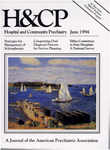Ethics Committees in State Mental Hospitals: A National Survey
Abstract
Objective: The goals of the study were to examine the composition, operation, and purpose of ethics committees in state mental hospitals, to determine whether committees were accessible to patients and family members, and to identify frequently addressed ethical issues. Methods: in june 1992 a 41-item survey questionnaire was mailed to chief executive officers of 204 state-operated general psychiatric inpatient facilities. Survey items asked about the facility's attributes, composition of the ethics committee, how the committee functioned, and the issues it addressed. Results: A total of 145 facilities from 46 states responded to the survey, for a response rate of 71 percent. Nearly half the facilities bad ethics committees, most of which were recently established. Physicians accounted for the plurality of committee membership, followed by nurses and administrators. Although several facilities gave patients access to committee meetings, few patients or their family members actually attended these meetings. issues such as patients' danger to others, resuscitation policies, and scarce resources were frequently addressed by many committees but were never addressed by others. Conclusions: Although many state mental hospitals have established ethics committees in the past few years, these committees may not meet patients' needs because of inadequate representation by patient advocates and family members. Numerous concerns were heard by committees, but no obvious patterns of pressing issues were revealed.
Access content
To read the fulltext, please use one of the options below to sign in or purchase access.- Personal login
- Institutional Login
- Sign in via OpenAthens
- Register for access
-
Please login/register if you wish to pair your device and check access availability.
Not a subscriber?
PsychiatryOnline subscription options offer access to the DSM-5 library, books, journals, CME, and patient resources. This all-in-one virtual library provides psychiatrists and mental health professionals with key resources for diagnosis, treatment, research, and professional development.
Need more help? PsychiatryOnline Customer Service may be reached by emailing [email protected] or by calling 800-368-5777 (in the U.S.) or 703-907-7322 (outside the U.S.).



